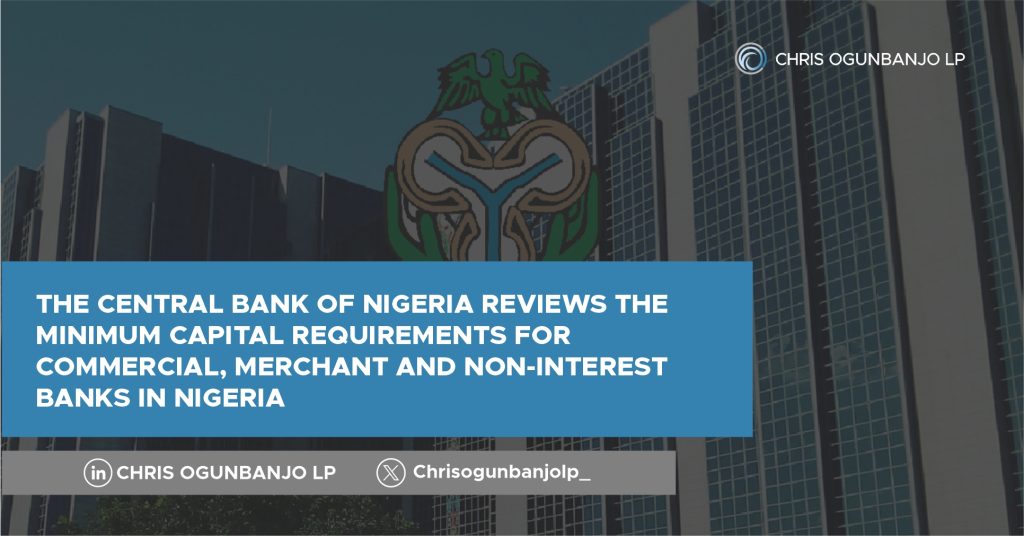CLIENT ALERT & KEY REGULATORY UPDATE | APRIL 2024
On the 28th of March 2024, the Central Bank of Nigeria (“CBN”) issued a circular addressed to all commercial, merchant & non-interest banks; and promoters of proposed banks (the “Circular”).[1] The CBN, via this Circular, has impliedly undertaken the upward review of the existing minimum share capital requirements for the aforementioned categories of banks which now mandates the recapitalization of entities holding banking licenses within Nigeria, as well as the need for clarity in this regard for promoters of proposed banks in Nigeria.
This recapitalization mandate, more specifically known as the Banking Sector Recapitalization Programme 2024 (the “Programme”), is an initiative by the CBN requiring holders of banking licenses in Nigeria to increase their minimum paid-in equity capital to a specified amount according to their license category and authorization within a specified period of time.[2]
The underlying aim and core objective of the Programme is to allow for the emergence of banks that can adequately cater for Nigeria’s forecasted US$1 Trillion economy by 2030. It is also the intent of the CBN to fortify the capital base of Nigerian banks to become globally competitive in the face of dire economic conditions.
In this client alert, we discuss the new minimum capital requirements, avenues for recapitalization as well as the CBN recommended recapitalization process, providing succinct clarity and insightful guides to the process.
NEW MINIMUM CAPITAL REQUIREMENTS
The new minimum capital requirements per the Circular are as follows:
-
Commercial banks with international authorization – #500,000,000,000.00 (Five Hundred Billion Naira)
-
Commercial banks with national authorization – #200,000,000,000.00 (Two Hundred Billion Naira)
-
Commercial banks with regional authorization –#50,000,000,000.00 (Fifty Billion Naira)
-
Merchant banks with national authorization – #50,000,000,000.00 (Fifty Billion Naira)
-
Non-interest banks with national authorization – #20,000,000,000.00 (Twenty Billion Naira)
-
Non-interest banks with regional authorization – #10,000,000,000.00 (Ten Billion Naira)
Prior to this upward review by the CBN, the capital requirements previously were as follows:
-
Commercial banks with international authorization – #50,000,000,000.00 (Fifty Billion Naira)
-
Commercial banks with national authorization –#25,000,000,000.00 (Twenty-Five Billion Naira)
-
Commercial banks with regional authorization – #10,000,000,000.00 (Ten Billion Naira)
-
Merchant banks with national authorization –#15,000,000,000.00 (Fifteen Billion Naira)
-
Non-interest banks with national authorization –#10,000,000,000.00 (Ten Billion Naira)
-
Non-interest banks with regional authorization – #5,000,000,000.00 (Five Billion Naira)
VIABLE AVENUES TO COMPLY WITH THE RECAPITALIZATION DIRECTIVE
With the implications of the directive given by the CBN to Banks within the scope of this Circular, such banks can explore certain avenues in order to ensure compliance with the new minimum share capital requirements. The recommended options include:
-
Injection of Fresh Equity Capital: Banks may increase their share capital to meet the new capital requirements via private placements, rights issue and/or offer for subscription. A private placement is a special offer whereby the securities/shares of a company are sold to a pre-arranged or specific buyer(s). A rights issue is a means whereby the existing shareholders of a company are given the opportunity to acquire more shares in the same company in proportion to their existing shareholdings. An offer for subscription is a means whereby a company issues the surplus unit of its share capital to the public. It is important to note that all three options provided herein are applicable to banks that are public limited liability companies while banks that are private limited liability companies may only explore the private placement or rights issue option.
-
Mergers and Acquisitions (M&As): Banks may meet this new capital requirement via mergers and acquisitions within the banking sector. The CBN has mandated that all liabilities and obligations (including the protection of depositors) are to be assumed by the acquiring entity. It is important to note that banks willing to explore the M&A route will trigger merger control issues which ultimately bring such transaction(s) under the purview of the Federal Competition and Consumer Protection Commission (FCCPC).
-
Upgrade/Downgrade of Licenses Category or Authorization: Banks also have the option of upgrading or downgrading their existing license category within the Three (3) available license categories, namely, commercial, merchant and non-interest banking licenses and under the respective authorizations (international, national and regional). In the instance that certain Banks cannot meet the new capital requirements, a downgrade of their current operating license may be a good idea.
THE OUTLOOK OF THE RECAPITALIZATION PROGRAMME
The Programme provides a compliance guideline for existing banks. Per the Circular, the new minimum share capital is to be made up of paid-up share capital and share premium only. For the avoidance of doubt, the CBN noted that shareholders’ fund and Additional Tier 1 (AT1) Capital cannot be used to meet the new minimum share capital requirements. Banks are also advised to ensure strict compliance with the minimum capital adequacy ratio (CAR) requirement for their respective licenses and authorizations.
The CBN also mandated all banks to submit an implementation plan clearly stating their chosen recapitalization option from the avenues described above and the various activities involved with their timelines by April 30, 2024. For promoters of proposed banks, the new minimum share capital requirements will become applicable for new applications for banking licenses submitted after April 1, 2024.
TIMEFRAME FOR COMPLIANCE
A timeframe of Twenty-Four (24) months, commencing from April 1, 2024, and terminating on March 31 2026, has been set by the CBN for the relevant banks to comply with the new minimum share capital requirements. The CBN has further advised existing and proposed banks to explore the available avenues for compliance within the set timeframe in order to avoid a revocation of their license.[3]
CONCLUSION
In the meantime, we advise all affected banks to promptly consult the relevant professional parties and advisers, choose their preferred recapitalization option and begin drawing up their implementation plan in order to meet the CBN’s implementation plan submission deadline of April 30, 2024.
This alert should not be construed as legal advice or a legal opinion on any specific facts or circumstances. This alert is not intended to create, and receipt of it does not constitute a lawyer-client relationship. The contents are intended for general informational purposes only, and you are urged to consult Chris Ogunbanjo LP concerning any particular situation and specific legal question you may have.
For further information or legal advice on any part of this alert please
contact:
Mr. Olawumi Alajiki,
Head of Chambers,
Chris Ogunbanjo LP
olawumi.alajiki@chrisogunbanjo.com
Peter-Cole C. Onele
Associate,
Chris Ogunbanjo LP
peter-cole.onele@chrisogunbanjo.com
Adedamola Odubanjo
Junior Associate,
Chris Ogunbanjo LP
adedamola.odubanjo@chrisogubanjo.com
Mariam Olabiyi
Junior Associate,
Chris Ogunbanjo LP
mariam.olabiyi@chrisogubanjo.com



